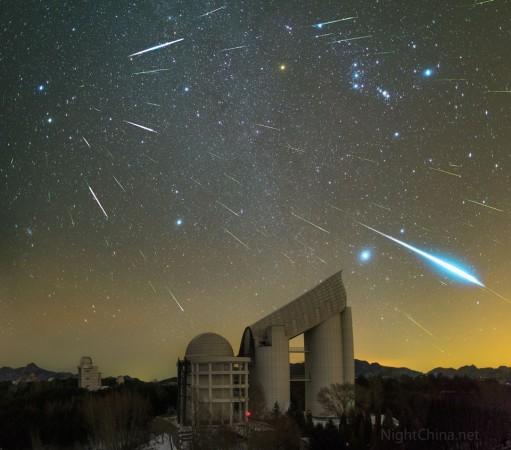
The best meteor shower of the year – annual Geminid – will be at its peak on the night of December 13 and 14, NASA has announced.
ALSO READ: SETI to study mysterious interstellar asteroid Oumuamua for signs of alien life
The astronomical event will lit up the sky, displaying an amazing show for the skywatchers. The Gemini meteor shower is present in the constellation Gemini.
"With August's Perseids obscured by bright moonlight, the Geminids will be the best shower this year. The thin, waning crescent Moon won't spoil the show," said Bill Cooke with NASA's Meteoroid Environment Office.
ALSO READ: Astronomer spots mysterious cigar-shaped objects in Orion nebula [WATCH VIDEO]
In most of the parts of the world, one can see the Geminids with naked eyes under dark and clear skies. The best view of the shower can be seen from the Northern Hemisphere.
ALSO READ: Orgasmic meditation: The latest creepy trend taking over New York
The shower will peak at rates around one per minute under good conditions on the night between December 13 and 14, Cooke explained.
The American Meteor Society stated that on the peak night of December 13 and 14 between the hours of 1:00 and 2:00 am local standard time (LST), an observer located in mid-northern latitudes under clear skies has the opportunity to view at least 75 Geminid meteors and those living in rural areas can watch more than hundreds of these meteors.
The Geminids are visible when Earth passes through a trail of debris which is left by an Apollo-class asteroid named 3200 Phaethon.
ALSO READ: Here's how you can heal love bites faster
According to Cooke, "Phaethon's nature is debated, it's either a near-Earth asteroid or an extinct comet, sometimes called a rock comet."
Geminids can be seen on nights before December 14 as well as after that, but their appearance will become less frequent.
ALSO READ: These non-alcoholic beverages help improve sleep
When these space dust enter Earth's atmosphere, they end up sparkling beautifully.
Phaethon was discovered by astronomers in 1983. This year the astronomers will have the opportunity to analyse Phaethon closely in mid-December as it will make its nearest pass by Earth since it was found.
"Skywatching is easy. Just get away from bright lights and look up in any direction! Give your eyes time to adjust to the dark. Meteors appear all over the sky," NASA stated.
ALSO READ: Here are 5 bizarre accidents that took place during sex
Keep in your mind that you watch the astronomical event from a region where there is as less light pollution as possible and there are no tall barriers to block your view.
In case the sky is cloudy and your view is being obstructed, you can watch the event online; NASA will broadcast the Geminid shower live via Ustream starting at sunset on December 13 from the Automated Lunar and Meteor Observatory at NASA's Marshall Space Flight Center in Huntsville, Alabama, IANS reported.








